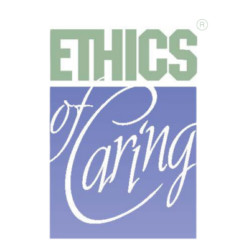2025 Conference
“We can’t underestimate the power of storytelling…stories have a way of speaking to the humanity within each of us and can help remind us of the humanity in others.”

Aimee Milliken, PhD, RN, HEC-C
Keynote Speaker, Day Two: Recognizing and Addressing Ethical Issues in Everyday Nursing Practice: The Role of Ethical Awareness
Aimee Milliken was interviewed by NNEC Planning Committee Member Ellen M. Robinson, RN, PhD, HEC-C, FAAN.
Click to Share this 2025 Spotlight!
Q:
The theme for the conference is “Everyday Ethics Rooted in Trust.” When you think about “everyday ethics,” what comes to mind? What has your experience been in keeping ethics front and center in your practice?
For me, everyday ethics involves recognizing the ethical implications of everything we do as nurses. We often teach about ethics in the context of big crises or dilemmas, but those situations make up such a small portion of the actual work of nursing. Staying attuned to the ethical import of even seemingly mundane tasks helps us to pick up on burgeoning ethical challenges early, when they are easier to resolve. The idea that everyday ethics underpins the nursing role is foundational to my work about ethical awareness. We need to be aware of the ethical implications of our actions in order to address ethical issues when they arise, and to notice recurring problems that require a preventive ethics approach. This work is critical to addressing sources of moral distress, as well.
– Aimee Milliken
Q:
The pandemic tested a sense of trust not only in healthcare, but in science itself. Moving forward, we know that public health is a critical dimension in promoting wellness. How can we help to instill amongst the public an awareness of both individual and community obligation to this ethical endeavor?
We can’t underestimate the power of storytelling. We know that people aren’t often swayed by the introduction of statistics and other fact-based information when it challenges a deeply held worldview. That said, I think stories have a way of speaking to the humanity within each of us and can help remind us of the humanity in others. In this way, narrative ethics can be a useful tool to help us see past ideological differences and remind us that we have care-based obligations to the people we are in community with, even when we disagree with one another.
– Aimee Milliken
Q:
What advice would you give frontline staff to develop and maintain trust among patients, families, communities and the health professions? What advice would you give nurse leaders? Hospital administrators?
In my opinion, developing and maintaining trust requires open and direct communication. We need to be sure to acknowledge uncertainty, and to be humble about what we know for sure and what we do not yet know. This is a big ask in our fast-paced and highly technological environments of care, and “grey areas” are uncomfortable places to sit. Acknowledging that grey when it exists is so important. We also need to acknowledge when the system has failed – our patients, our colleagues, and ourselves. Being
honest in the challenging times when we wish we could do better, or when we wish we had better options to offer, is a critical piece of this. We know that our healthcare system has profound limitations
and unfortunately our patients, especially our most vulnerable patients, often suffer the consequences of that. Starting from a place of acknowledging these shortcomings, even if we can’t immediately fix them, is a difficult but necessary first step.
– Aimee Milliken
Q:
Our choice of words can change the meaning of what we are attempting to convey. A good example is discussing “withdrawing care.” Clinicians are aware that we never withdraw care at the end of life. Adjusting that language to withdrawal of technology or treatment that is harmful or no longer beneficial changes the conversation. Can you think of other examples of language that creates misunderstanding?
There are so many examples within the healthcare lexicon of phrases that inadvertently create misunderstanding and even contribute to mistrust. I often think of code status discussions when we ask families if they want us to “do everything” for their loved one, and we get frustrated when the answer to this question is “yes.” It is human nature for a loving family member to want a team to “do everything” – but if we aren’t explicit about what we are asking, we can end up pursuing a plan of care that feels medically inappropriate and incongruous with the patient’s actual goals and values. I also think about “fighting” analogies in the context of terminal illnesses like cancer. While fighting is a noble and worthy goal, this framing can also inadvertently send the message that transitioning the goals of care to a focus on comfort is “losing,” when we know in actuality this is a transition that requires courage and bravery as well.
